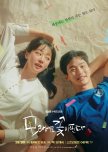This review may contain spoilers
Sometimes grumpy & gruff, sometimes touchingly sweet & unabashedly sincere, radiating joy & warmth
“Like Flowers in Sand” is enchanting in its own way. Here we have once again a KDrama with a distinctive aura. Rustic, with tons of heart, original characters and great performance. Without tons of make-up, yet with plenty of bare male torsos - here, for a change, not focusing on aesthetic ideals… (which sort of makes this KDrama even more likeable and even more authentic.) Love also has a subtle hand in it here and conjures up a rather unconventional Rom+Com in the guise of a crime thriller.
“Like Flowers in Sand” takes a look at the rural regions – with their living traditions, the lively gossip and the importance of lifelong childhood friendships. The way people interact with each other is a little rough, but still warm; sweet even, yet in a grumpy disguise.
The KDrama draws its significant charm from the tradition and lifestyle of the Ssireum wrestlers. The two protagonists grew up with Ssireum (see side note below). In general, Ssireum marks the dramaturgical pivot of the story - then and now.
The gym, the sand-filled wrestling field, the colorful ´satpas´, and the ML tirelessly running here and there and back again, all of this contributes to an unmistakable look&feel. In addition, "Like Flowers in Sand" is sometimes grumpy and gruff, sometimes touchingly sweet and unabashedly sincere - with three-dimensional, unconventional characters in their unique individuality quietly conquering the hearts of the audience. A KDrama solidly grounded in the life of ordinary people, that in its quirky, eccentric aura radiates joy and warmth.
----------------------------------------------------------------
SIDE NOTE: --- Ssireum – Korean version of wrestling ---
Ssireum has been listed as a UNESCO immaterial world heritage since 2018. This distinctive Korean wrestling is probably as old as the first kingdom of Korea itself, which according to legend was founded in 2333 BC. What is certain though, this form of wrestling has already been practiced during the time of the Goguryeo Kingdom. The strongest young men from the surrounding villages came together for competition, with the last man standing at the end being the winner.
Ssireum is the wrestling of two people within a circular field filled with sand with a diameter of 8 m. So-called 'satpas' form a kind of belt over the wrestling pants that the opponents at all cost hold on to during the fight - until one can bring the other down by strength or skill. The techniques are varied, but hitting and pushing are not among them.
Actually, previous to colonial times, this type of wrestling was known as Gakjo, Gakhi, Sangbak, Jaenggyo or Gakgi. Wrestling was tolerated under the Japanese because it had similarities to sumo. Competitions were successively sponsored, which ultimately led to national championships. To this day, Ssireum is an established and popular sport in South Korea being practiced by women, too.
Eventually, with Netflix broadcasting this ENA Production internationally, the immaterial cultural heritage is reaching more worldwide attention, too...
“Like Flowers in Sand” takes a look at the rural regions – with their living traditions, the lively gossip and the importance of lifelong childhood friendships. The way people interact with each other is a little rough, but still warm; sweet even, yet in a grumpy disguise.
The KDrama draws its significant charm from the tradition and lifestyle of the Ssireum wrestlers. The two protagonists grew up with Ssireum (see side note below). In general, Ssireum marks the dramaturgical pivot of the story - then and now.
The gym, the sand-filled wrestling field, the colorful ´satpas´, and the ML tirelessly running here and there and back again, all of this contributes to an unmistakable look&feel. In addition, "Like Flowers in Sand" is sometimes grumpy and gruff, sometimes touchingly sweet and unabashedly sincere - with three-dimensional, unconventional characters in their unique individuality quietly conquering the hearts of the audience. A KDrama solidly grounded in the life of ordinary people, that in its quirky, eccentric aura radiates joy and warmth.
----------------------------------------------------------------
SIDE NOTE: --- Ssireum – Korean version of wrestling ---
Ssireum has been listed as a UNESCO immaterial world heritage since 2018. This distinctive Korean wrestling is probably as old as the first kingdom of Korea itself, which according to legend was founded in 2333 BC. What is certain though, this form of wrestling has already been practiced during the time of the Goguryeo Kingdom. The strongest young men from the surrounding villages came together for competition, with the last man standing at the end being the winner.
Ssireum is the wrestling of two people within a circular field filled with sand with a diameter of 8 m. So-called 'satpas' form a kind of belt over the wrestling pants that the opponents at all cost hold on to during the fight - until one can bring the other down by strength or skill. The techniques are varied, but hitting and pushing are not among them.
Actually, previous to colonial times, this type of wrestling was known as Gakjo, Gakhi, Sangbak, Jaenggyo or Gakgi. Wrestling was tolerated under the Japanese because it had similarities to sumo. Competitions were successively sponsored, which ultimately led to national championships. To this day, Ssireum is an established and popular sport in South Korea being practiced by women, too.
Eventually, with Netflix broadcasting this ENA Production internationally, the immaterial cultural heritage is reaching more worldwide attention, too...
Was this review helpful to you?


 9
9 39
39 15
15
















